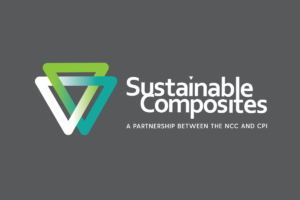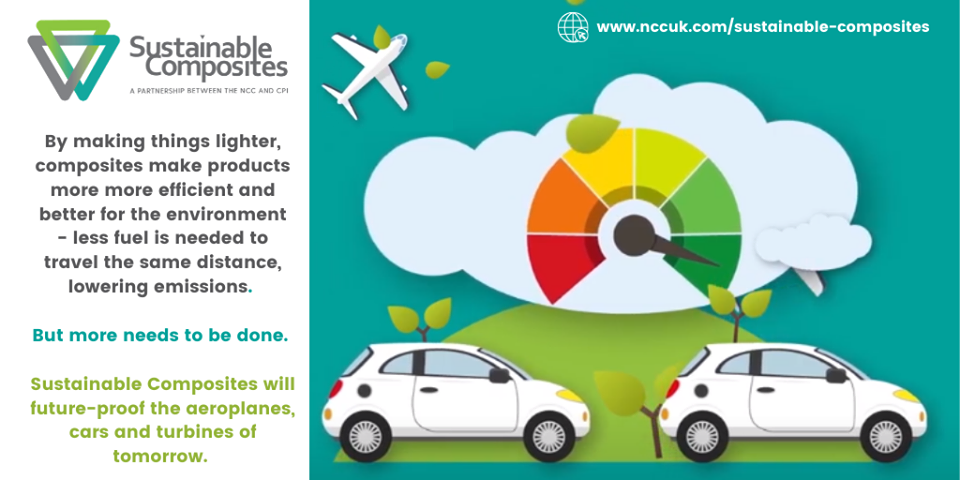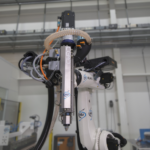A new initiative to address the challenge of reusing or recycling composites at the end of their life starts in the UK, where of the 110,000 tonnes of composites produced each year, currently only 15% will be reused or recycled at the end of their life. This initiative, named Sustainable Composites, aims to develop the next generation of eco-friendly composite materials, looking at the whole lifecycle of composites to future-proof the aeroplanes, cars and turbines of tomorrow.
Led by the National Composites Centre (NCC) and the Centre for Process Innovation (CPI) – two of the seven High Value Manufacturing Catapult centres – Sustainable Composites is a partnership between industry, academia and government that will harness the UK’s composites research and technology development capabilities to capitalise on this rapidly growing circ. £2bn global market for end-of-life recycling.
The difficult of recycling composites
Composites are in high demand by manufacturers developing the next generation of lightweight, super energy-efficient planes, cars and wind turbines. Compared to metals and other materials, composites are lighter, stronger, more durable, longer-lasting, and allow more flexibility in design. But 85% of these valuable materials are currently not being reused or recycled at the end of their life.
 Today’s advanced composites are complex structures comprising layers of materials and resin that are heated and compressed to create the materials. Whilst they can increase the lifespan of products by decades and reduce their environmental impact, unpicking these elements in a recycling process is difficult, and current recycling techniques often degrade the material’s performance, reducing their value and offering limited applications. In addition, more than 95% of composites are made from raw materials and resins that are derived from oil, making them unsustainable.
Today’s advanced composites are complex structures comprising layers of materials and resin that are heated and compressed to create the materials. Whilst they can increase the lifespan of products by decades and reduce their environmental impact, unpicking these elements in a recycling process is difficult, and current recycling techniques often degrade the material’s performance, reducing their value and offering limited applications. In addition, more than 95% of composites are made from raw materials and resins that are derived from oil, making them unsustainable.
Sustainable Composites
Sustainable Composites is set to address these challenges by accelerating the development of new recycling technologies while simultaneously creating new sustainable composites made from bio-based materials including vegetable waste, corn, nutshells and algae.
 The UK is already leading in ground-breaking technologies for composites recycling. The NCC, based in Bristol, has developed a new technology with Oxford Brookes University, which separates (or disbonds) composite structures quickly and cheaply using a simple heat source. CPI worked with Fibreright to develop a novel method to generate sustainable added value products from municipal solid waste. Additionally, ELG Carbon Fibre Ltd, based in the West Midlands, UK, is the world’s first commercial recycler of carbon fibre composites.
The UK is already leading in ground-breaking technologies for composites recycling. The NCC, based in Bristol, has developed a new technology with Oxford Brookes University, which separates (or disbonds) composite structures quickly and cheaply using a simple heat source. CPI worked with Fibreright to develop a novel method to generate sustainable added value products from municipal solid waste. Additionally, ELG Carbon Fibre Ltd, based in the West Midlands, UK, is the world’s first commercial recycler of carbon fibre composites.
The “Steam to Value Stream” project is investigating how an innovative steam process developed and patented by B&M Longworth, an SME based in Blackburn, UK, can be used for reclaiming resin and fibres from a composite component. The team will then explore how these materials can be used in the HiPerDiF technology developed at the University of Bristol – a novel fibre realignment process that takes discontinuous short fibres and aligns them into ready-to-lay composite tapes to be used in aerospace, automotive and wind turbine manufacturing.
Then, “Bio-Bolster” project will explore bio-derived resins for high volume manufacturing applications, and includes developing an understanding of supply chains, design requirements and performance characteristics to produce a novel material with less impact on the environment.
The UK expertise in composites recycling process
Richard Oldfield, Chief Executive at the NCC, said: “We have the expertise in the UK to develop the technologies and processes that make composite materials a net zero carbon alternative. We need to accelerate that innovation and lock-in sustainability from design to end-of-life – and that’s where the NCC can help. By joining forces with CPI in this initiative, we are bringing together our engineers, our technologies and our network of universities and companies to build a robust supply chain in the UK.”
Ed Goodman, Programme Lead for Sustainable Composites, said: “Composites are already supporting sustainability and helping companies meet their low carbon goals by dramatically reducing weight without impacting their performance, enabling critical renewable energy sources. Composites are making aircraft more fuel efficient, increasing the range of electric vehicles, and helping companies build huge wind turbine blades to power our homes. This initiative will harness our composites research and technology capabilities to make zero impact composites a reality.”
Frank Millar, Chief Executive Officer at CPI, said: “The Sustainable Composites partnership builds on successful pilot projects delivered in close partnership between industry and the research and technology community. Adopting and embedding sustainable manufacturing practices through the whole of the composite materials lifecycle is a compelling opportunity to reduce the environmental impact from these products.”
This initiative relies on the involvement of organisations from across industry to feed in ideas and shape future work. Companies who would like to get involved are invited to visit www.nccuk.com/sustainable-composites or email sustainable.composites@nccuk.com.
Source: NCC













